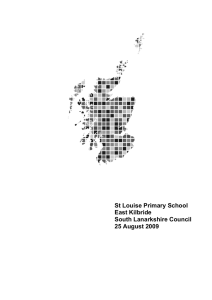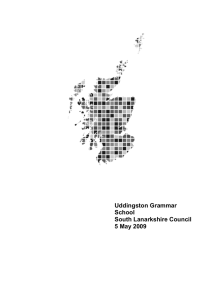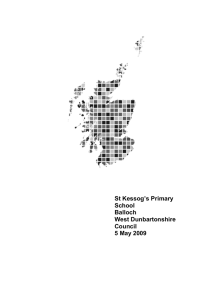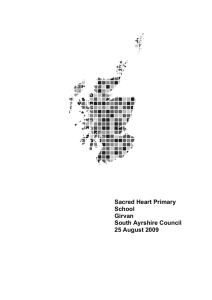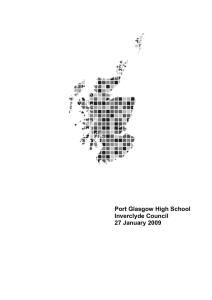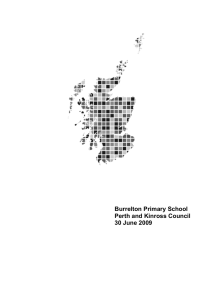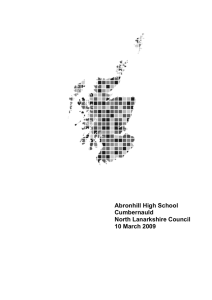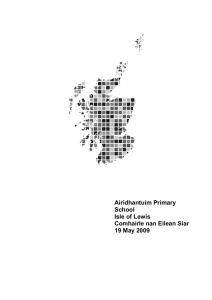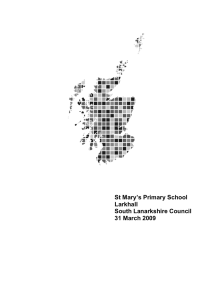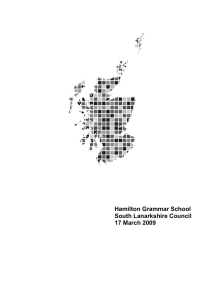Knoxland Primary School Dumbarton West Dunbartonshire
advertisement
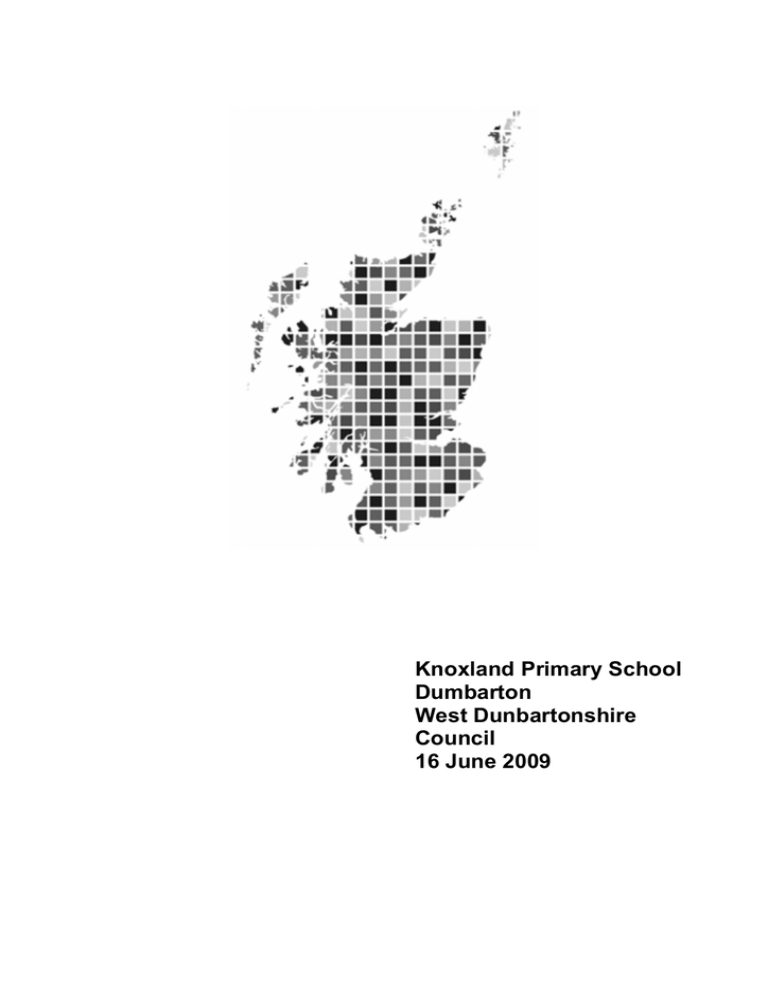
Knoxland Primary School Dumbarton West Dunbartonshire Council 16 June 2009 This report tells you about the quality of education at the school1. We describe how children benefit from learning there. We explain how well they are doing and how good the school is at helping them to learn. Then we look at the ways in which the school does this. We describe how well the school works with other groups in the community, including parents2 and services which support children. We also comment on how well staff and children work together and how they go about improving the school. Our report describes the ‘ethos’ of the school. By ‘ethos’ we mean the relationships in the school, how well children are cared for and treated and how much is expected of them in all aspects of school life. Finally, we comment on the school’s aims. In particular, we focus on how well the aims help staff to deliver high quality learning, and the impact of leadership on the school’s success in achieving these aims. If you would like to learn more about our inspection of the school, please visit www.hmie.gov.uk. Here you can find analyses of questionnaire returns. Where applicable, you will also be able to find descriptions of good practice in the school. 1 2 The term ‘school’ is used to include the work of the nursery class, where relevant. Throughout this report, the term ‘parents’ should be taken to include foster carers, residential care staff and carers who are relatives or friends. Contents 1. The school 2. Particular strengths of the school 3. Examples of good practice 4. How well do children learn and achieve? 5. How well do staff work with others to support children’s learning? 6. Are staff and children actively involved in improving their school community? 7. Does the school have high expectations of all children? 8. Does the school have a clear sense of direction? 9. What happens next? 1. The school Knoxland Primary School is a non-denominational school. It serves the east of Dumbarton. The roll was 324 when the inspection was carried out in April 2009. Pupils’ attendance was in line with the national average in 2007/2008. 1 2. Particular strengths of the school • Polite, well-behaved and motivated children who enjoy learning. • The quality of relationships and ethos of mutual respect between adults and children. • The wide range of experiences for children to achieve during school and out-of-school hours. • The outstanding contribution to children’s learning experiences made by support and catering staff. • The leadership of the head teacher and promoted staff in securing improvements for children. 3. Examples of good practice • Information and Communication Technology (ICT). • The involvement of catering staff in health promotion. 4. How well do children learn and achieve? Learning and achievement Across the school, children are keen to learn. They work very well together in groups and are becoming more aware of their strengths as learners. They evaluate their own and their classmates’ work. In physical education and drama activities, children follow instructions carefully and perform with confidence. Children use ICT confidently 2 for a range of purposes, including creating digital animations and movies, carrying out research and presenting talks. Across the school, children achieve success in a wide variety of ways and are very proud of their achievements. The indoor athletics team regularly enjoys success in local competitions and the accomplished school orchestra performs regularly at concerts and other school events. Children have helped to achieve an Eco-Schools Scotland silver award for the school. They have also organised a highly successful ‘eco’ fashion show. Children have good personal and social skills. They have a very good understanding of how to keep themselves safe, fit and healthy. Children are developing confidence through taking part in stimulating school outings and by meeting a variety of visitors to the school. Over the last few years, children’s attainment has improved in reading and writing but fluctuated in mathematics. Most children attain appropriate national levels in reading and writing and mathematics. Most are making very good progress in all areas of English language. In mathematics, almost all children make very good progress at the early stages but they do not always sustain this as they move through the school. Children with additional support needs are making good progress in their learning. Most children read very well and talk enthusiastically about their favourite books and authors. They can use reference books to find information very well. For example, children in P5 used books and the Internet effectively to research the history of The Titanic. Most children listen well to adults and respond appropriately in carrying out instructions. They are good at listening to each other and in taking turns when working in groups. In mathematics, most children are confident in solving problems and doing mental and written calculations. Curriculum and meeting learning needs Staff have made a very good start to developing aspects of the national initiative, Curriculum for Excellence. The well-planned curriculum is helping children to develop a wide range of skills and knowledge. Staff provide children with stimulating activities which include learning about enterprise, sustainability, citizenship and health. All children are benefiting from two hours of good quality physical 3 education each week. Teachers are increasingly planning tasks and activities which develop children’s skills in literacy, numeracy and information and communications technology (ICT) across other areas of their learning. For example, children in P4 are able to use their knowledge about 3D shapes very well to design and build models of castles. With the help of visiting specialists, children are developing very effective skills in music and physical education. Across the school, staff meet children’s learning needs effectively. Staff know children and their families well and work together to provide a supportive and caring environment for learning. Tasks, activities and resources are well matched to most children’s needs. At times, work is not challenging enough for higher-achieving children. Teachers give clear explanations and share the purpose of lessons with children. Most teachers are skilled at explaining clearly to children what they expect them to learn and use questioning well check for understanding. Varied and interesting homework supports children’s learning. There is scope to involve children more in planning and setting targets for their own learning. Teachers and classroom assistants work very well together to provide high-quality support to children with identified additional learning needs. These children are making good progress towards meeting their personal targets for learning. 5. How well do staff work with others to support children’s learning? The school works closely with the supportive Parent Council and parent-teacher group. Parents support the work of the school very well by helping on school trips, running after-school clubs and acting as helpers in classes. Staff keep parents well informed through helpful progress reports and interesting newsletters. Parents are consulted on important aspects of school life including sensitive health issues. There is scope to involve parents more fully as partners in their child’s learning. The school’s strong partnerships with support services enhance the quality of children’s learning. A few children who lack 4 confidence or find work difficult are benefitting from working regularly with volunteers from the Retired and Senior Volunteer Programme. Active Schools staff and local sports coaches provide children with a wide range of stimulating activities. Teachers use information from local nursery staff to support children well when they arrive in P1. The school has effective arrangements to help children move confidently and successfully from P7 to Dumbarton Academy. There are appropriate arrangements to deal with complaints or concerns from children and parents. 6. Are staff and children actively involved in improving their school community? Many children are actively involved in improving the school. This includes contributing to the pupil council, eco group or acting as junior road safety officers. At all stages, children are developing leadership skills as helpers, monitors and young leaders. Older children help younger ones as buddies and encourage them to take part in playground games. Children in P1 visit local nursery schools to tell pre-school children about Knoxland Primary School and read them stories. Across the school staff work very well together. Support, clerical and janitorial staff contribute significantly to the life and work of the school. The catering staff’s partnership working with teachers and children is outstanding. As a result, the numbers of children attending the breakfast club and choosing to have a school meal have increased significantly over the last year. Promoted staff have developed and use a range of effective activities to monitor classroom practice and track children’s progress in learning. This has resulted in improvements to the curriculum, attainment in English language and in children’s learning experiences. Teachers are becoming increasingly effective in evaluating learning and teaching. They are committed to improving outcomes for children and are working to address important priorities. 5 7. Does the school have high expectations of all children? The school has a welcoming and purposeful atmosphere. Children and staff work together very well to create an ethos of mutual respect. Children say that bullying is rare and that they feel safe, happy and well cared for in school. Staff meet children’s health, emotional and social needs very well and are clear about their responsibilities for child protection. There are appropriate procedures in place to monitor and encourage children’s attendance at school. Children are encouraged to achieve their best and to be proud of themselves and their school. Their work is valued and displayed attractively in classes and open areas. Children have good opportunities for religious observance at regular assemblies which are occasionally led by the school chaplain. Children are developing their understanding of diversity, equality and fairness through working with children at St Patrick’s Primary School on anti-sectarianism. 8. Does the school have a clear sense of direction? The headteacher is highly effective in promoting the school’s welcoming ethos in the school. She is supported very well by the depute headteachers and principal teacher who carry out their remits very effectively. As a team, they provide a strong lead in curriculum development. Teachers are keen to develop their skills and should continue with plans to share good practice with each other. The school is well placed to improve further. 6 9. What happens next? The school’s use of self-evaluation is leading to improvements in children’s learning. As a result, the inspection team was able to change its focus during the inspection to help the school plan to improve even more. HMIE will make no further visits following publication of this report. The education authority will let parents know about the school’s progress. It will do this as part of its normal arrangements for reporting on the quality of its schools. We have agreed the following areas for improvement with the school and education authority. • Continue to improve attainment in mathematics. • Ensure that tasks and activities are at the right level to enable higher-achieving children to achieve to their potential. • Strengthen the school’s approaches to self-evaluation. 7 Quality indicators help schools and nursery classes, education authorities and inspectors to judge what is good and what needs to be improved in the work of a school and a nursery class. You can find these quality indicators in the HMIE publications How good is our school? and The Child at the Centre. Following the inspection of each school, the Scottish Government gathers evaluations of three important quality indicators to keep track of how well all Scottish schools and nursery classes are doing. Here are the evaluations for Knoxland Primary School. Improvements in performance Learners’ experiences Meeting learning needs good very good good We also evaluated the following aspects of the work of the school The curriculum Improvement through self-evaluation HM Inspector: Lesley A Allen 16 June 2009 8 very good good To find out more about inspections or get an electronic copy of this report go to www.hmie.gov.uk. Please contact the Business Management and Communications Team (BMCT) if you wish to enquire about our arrangements for translated or other appropriate versions. If you wish to comment about any of our inspections, contact us at HMIEenquiries@hmie.gsi.gov.uk or alternatively you should write in the first instance to BMCT, HM Inspectorate of Education, Denholm House, Almondvale Business Park, Almondvale Way, Livingston EH54 6GA. Our complaints procedure is available from our website www.hmie.gov.uk or alternatively you can write to our Complaints Manager, at the address above or by telephoning 01506 600259. If you are not satisfied with the action we have taken at the end of our complaints procedure, you can raise your complaint with the Scottish Public Services Ombudsman (SPSO). The SPSO is fully independent and has powers to investigate complaints about Government departments and agencies. You should write to SPSO, Freepost EH641, Edinburgh EH3 0BR. You can also telephone 0800 377 7330, fax 0800 377 7331 or e-mail: ask@spso.org.uk. More information about the Ombudsman’s office can be obtained from the website at www.spso.org.uk. This report uses the following word scale to make clear judgements made by inspectors. excellent very good good satisfactory weak unsatisfactory outstanding, sector leading major strengths important strengths with some areas for improvement strengths just outweigh weaknesses important weaknesses major weaknesses Crown Copyright 2009 HM Inspectorate of Education
